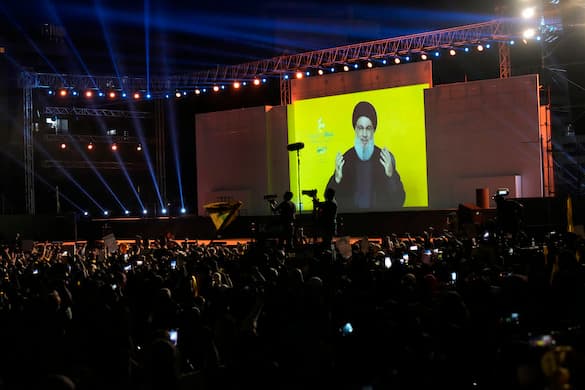With Attacks on Israel, Iran Proxies Are Forcing Biden’s Hand on Tehran Policy
Even as administration members acknowledge that Tehran backs Hamas, they issue lawyerly statements that seem designed to exonerate the Islamic Republic. That soon may have to change.

Even as Washington officials studiously refrain from pointing fingers at the Islamic Republic of Iran, Tehran’s proxies are escalating the war that one of them, Hamas, launched on Saturday.
On Tuesday, President Biden cautioned countries or organizations, which he did not identify, against joining Hamas’s war, regarding which the president used the words “sheer evil.” His warning on joining the war: “Don’t.” The next day, Israelis were convinced that a real Iran-backed terrorist organization, Hezbollah, did just what Mr. Biden warned against.
While an all-out war was averted and fears temporarily subsided, worries of a second war front are never far from the minds of Israelis and Lebanese. Hezbollah has never hid its ideological kinship with other Iran-backed groups, including Hamas.
A report issued on Wednesday by a northern Israel-based think tank, Alma, details how Iranian officials, including the foreign minister, Hossein Amir-Abdollahian, met representatives of Hamas and the Palestinian Islamic Jihad, while Hezbollah’s chief, Hassan Nasrallah, serves as liaison. In these meetings, Tehran reportedly green-lit the Hamas attack.
The Alma account follows a similar Wall Street Journal report based on Beirut sources. Other publications were more circumspect. The Washington Post slightly pushed back, but acknowledged Iran’s backing of Hamas. The strongest refutation, based on U.S. intelligence sources, was issued by the New York Times, which claimed the Hamas attack “surprised” Tehran.
Evidence is abundant of coordination between Hamas and Hezbollah, though, and CNN is reporting Wednesday that an unidentified Israeli official said that Iran “gave the green light” to the Hamas attack.
Millions of people living in north Israel, including the country’s third-largest city, Haifa, were instructed Wednesday to stay indoors and move to safe rooms. Reports that several flying objects entered Israel’s airspace were later refuted.
Yet, a barrage of mortars was launched Wednesday from Lebanon at Israel’s northernmost town, Metula. It followed several exchanges of fire between Israel and Hezbollah on Monday and Tuesday, indicating that the terror organization’s chief, Mr. Nasrallah, is constantly testing the limits of Israel’s willingness to engage in a two-front war.
Meanwhile, even as members of the Biden administration acknowledge that Tehran finances, arms, and trains Hamas, they also constantly issue carefully crafted, lawyerly statements that seem designed to exonerate the Islamic Republic.
“We’re looking to acquire further intelligence,” the national security adviser, Jacob Sullivan, told reporters Tuesday. While Iran plays a “sustained, deep, and dark role” in backing Hamas, he said, “in terms of this particular gruesome attack on October 7, we don’t currently have that information” that Tehran was involved.
A war like the one Hamas launched Saturday starts with “team consultation, then moves to political approval, and eventually to the operational echelons,” Alma’s president, Sarit Zehavi, writes. In this case, Hezbollah’s Mr. Nasrallah was a liaison between Tehran and top Hamas and Palestinian Islamic Jihad military operatives residing in Lebanon.
On August 12, according to Ms. Zehavi, Mr. Nasrallah met with Iranian officials, “likely to define the goals of the plan.” That day the Iranian foreign minister, Mr. Amir-Abdollahian, visited Riyadh. Sensing progress there in Saudi-Israeli negotiations, and seeking to undermine it, he “dispatched an adviser to Nasrallah, urging him to complete the operational plan” with Hamas, Ms. Zehavi writes.
On September 1, she reports, Mr. Nasrallah met with Mr. Amir-Abdollahian again, “for final approval of the plans.” On the following day, “Nasrallah met with Hamas and Islamic Jihad to inform them that the authorization had been obtained.”
Speaking with Mr. Biden on the phone Wednesday, Prime Minister Netanyahu warmly thanked the president for his strong support of Israel. The president’s speech on Tuesday was widely applauded across Israel’s political factions. Security officials are praising their growing military coordination with the Pentagon.
Perhaps fearing harm to these ties, Jerusalem is officially mum on the growing debate in America over the degree of Tehran’s involvement in launching the war. Meanwhile, as Secretary Blinken told CNN Sunday, “Hamas wouldn’t be around in the way that it is without the support that it’s received from Iran over the years.”
The administration’s insistence on nevertheless quibbling over the precise role Tehran played in preparing for the war is a distinction without a difference. Perhaps it is designed to rescue three years of attempts to reach the mullahs diplomatically. Yet, and despite considerable easing of sanctions, Tehran has turned down all of Washington advances.
For years, Iran has used huge resources to build a ring of terrorist proxies that share the Islamic Republic’s declared desire to erase Israel off the map. These proxies now surround the Jewish state from the south, north, and east. They are all “arms of the same octopus, and its head is in Iran,” a former Israeli prime minister, Naftali Bennett, said Monday.
Mr. Biden’s support of Israel seems heart-felt. To translate it to action, he will increasingly be pushed to turn away from appeasing and accommodating Iran, and instead reinstate a policy of oppressive pressure on a country at the center of the anti-American Sino-Rus-North Korean axis.

